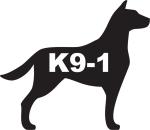Simona Cafazzo, Sarah Marshall-Pescini, Jennifer L. Essler, Zsofia Viranyi, Kurt Kotrschal, Friederike Range 2018
ABSTRACT
Puppy packs (consisting of only puppies) and mixed-age packs (composed of puppies and adults) were observed to test whether social play can be used for assessing and establishing social relations in wolves, Canis lupus. Differently from previous studies, we looked at play behaviours in detail, allowing us to categorize play interactions as either competitive or relaxed, and predicted that different types of play would be associated with different relationships between individuals. We found that the more time dyads spent in relaxed play, the more affiliative interactions they exchanged outside of play. In the mixed-age packs, dyads that spent more time in both relaxed and competitive play showed fewer exchanges of aggressive behaviours. Conversely, in puppy packs, the more time dyads spent in competitive play, the more aggressive interactions were exchanged outside of play. Since clear dominance relationships emerged in the mixed-age packs, but not in puppy packs, we suggest that play can help to reduce the frequency of aggressive interactions only when a clear hierarchy exists between pack members. Furthermore, we found that in both puppy and mixed-age packs, dominance relationships were reflected and rarely reversed during play. Finally, dyads with a less clear dominance relationship spent more time playing in a competitive way. Overall, our results support the social assessment hypothesis suggesting that social relationships outside of play are reflected during playful interactions. Moreover, we revealed how different types of play, that is, playing in a competitive or relaxed way, may be related to different social relationships. This distinction between play types has not been acknowledged before but could help researchers better understand the functions of play in different species.
Download full study below


Responses